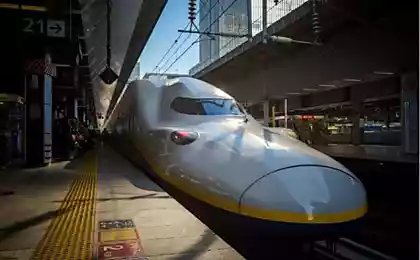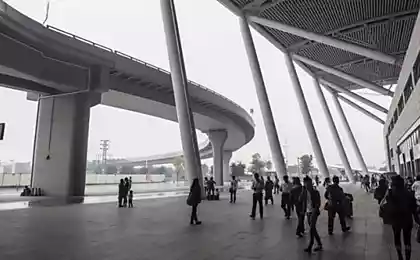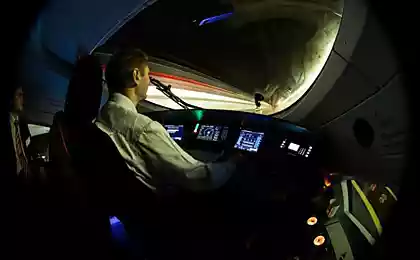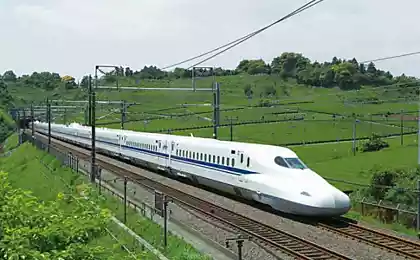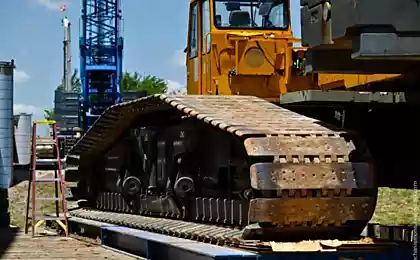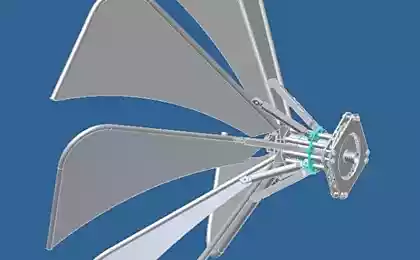1137
New world speed record on rails
Speed record in rail transport 574 km \ h stayed with 2007
While in 2014 the Chinese экспериментальный High-speed train CIT500 on tests on the experimental part of the track under the Qingdao length 100.8 kilometers set a new speed record in 605 km \ h
A bit of history, value and prospects of development of Chinese railways - under the cut
Generally, writing topic I pushed comment user Mad__Max , who asked a reasonable question about the cost of Chinese railways. I tried to find out.
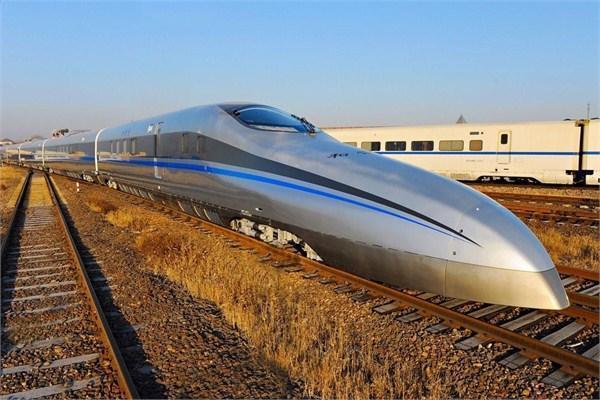
Well, the history of the issue can, in principle, be omitted. Everybody knows - the world's longest high-speed rail network, 2,200 km from Beijing to Guangzhou in 8 hours, a sharp jump from the locomotive (the last steam locomotive was launched in 2005) to high-speed trains (the first line put into operation in 2008) etc.
To date, every capital of the province (except absolutely deaf Western) is connected to the high-speed rail \ d, about 45% - this is line with the design speed of 200-250 km \ h, 55% - up to 350 km \ h. After the crash of 2008 line Wuhan-Guangzhou maximum speed of trains was reduced from 350 km \ h to 300 to eliminate the causes of the accident and improvements trains. CIT500, in principle, should be the first train, for which in 2016 will be removed and the speed limit, he will ride at a speed of 350-380 km \ h.
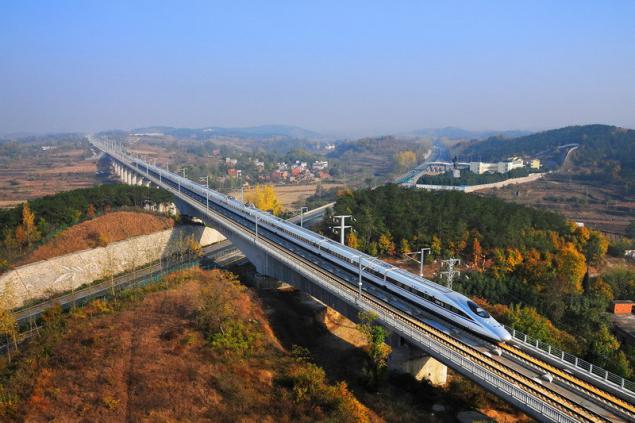
About the cost - the issue have been mixed. The undisputed leader in the cost of one kilometer of road is, of course, the Shanghai maglev - with a length of 29.83 km section of the total cost of construction amounted to about 9.7 billion yuan ($ 1 = 6.2 yuan), and, accordingly, the cost per kilometer - 325 million yuan.
Well, the most expensive on the total cost of steel, of course, the project is high-speed line Beijing-Guangzhou, which is commissioning gradually sites and recently opened to traffic on it from the destination to the final. Total cost of the 2298 kilometer road was the astronomical sum of 400,000,000,000 yuan.
The cost of the road is ten times depending on the design speed, type of soil, the need for racks and so on. The approximate cost per kilometer:
1) Циньхуандао-Шеньян - 37,000,000 yuan per kilometer
2) Хэфэй-Вухань - 46,000,000 yuan per kilometer
3) Вэньчжоу-Фучжоу - 60,000,000 yuan per kilometer
4) Пекин-Шанхай - 167,000,000 yuan per kilometer
5) Пекин-Тяньцзинь - 180,000,000 yuan per kilometer.
Actually, as I understand, to compare the cost of building a maglev railway unscientific. Dozens of railways, they are built in different conditions, as long as a maglev and known only to the cost of the line in exactly these conditions.
However, the extension of the Shanghai maglev project to Hangzhou finally closed, and experiments to achieve high speeds using conventional rail staff clearly indicate that in the near future other lines of magnetic levitation train in China, we will not see.
A planned increase in speed to 380 km \ h will make air travel a distance of 1000 km generally unprofitable. Beijing-Shanghai trip by plane takes about 4 hours (2 hours of pure flight time hour + \ + an hour from the airport to register \ delivery \ receipt of baggage, etc.) and by train - 5. Increase speed by 25% equalize this time.
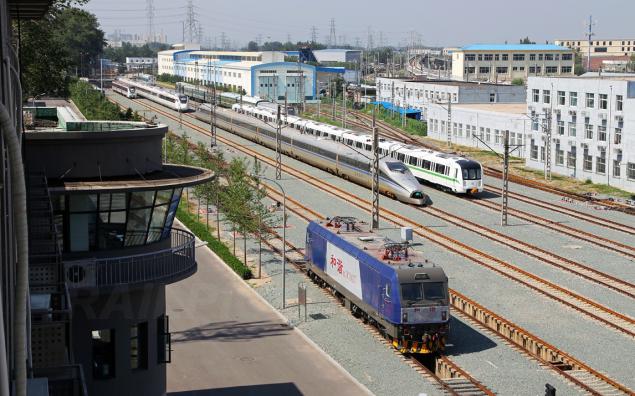
Source: geektimes.ru/post/249390/
While in 2014 the Chinese экспериментальный High-speed train CIT500 on tests on the experimental part of the track under the Qingdao length 100.8 kilometers set a new speed record in 605 km \ h
A bit of history, value and prospects of development of Chinese railways - under the cut
Generally, writing topic I pushed comment user Mad__Max , who asked a reasonable question about the cost of Chinese railways. I tried to find out.

Well, the history of the issue can, in principle, be omitted. Everybody knows - the world's longest high-speed rail network, 2,200 km from Beijing to Guangzhou in 8 hours, a sharp jump from the locomotive (the last steam locomotive was launched in 2005) to high-speed trains (the first line put into operation in 2008) etc.
To date, every capital of the province (except absolutely deaf Western) is connected to the high-speed rail \ d, about 45% - this is line with the design speed of 200-250 km \ h, 55% - up to 350 km \ h. After the crash of 2008 line Wuhan-Guangzhou maximum speed of trains was reduced from 350 km \ h to 300 to eliminate the causes of the accident and improvements trains. CIT500, in principle, should be the first train, for which in 2016 will be removed and the speed limit, he will ride at a speed of 350-380 km \ h.

About the cost - the issue have been mixed. The undisputed leader in the cost of one kilometer of road is, of course, the Shanghai maglev - with a length of 29.83 km section of the total cost of construction amounted to about 9.7 billion yuan ($ 1 = 6.2 yuan), and, accordingly, the cost per kilometer - 325 million yuan.
Well, the most expensive on the total cost of steel, of course, the project is high-speed line Beijing-Guangzhou, which is commissioning gradually sites and recently opened to traffic on it from the destination to the final. Total cost of the 2298 kilometer road was the astronomical sum of 400,000,000,000 yuan.
The cost of the road is ten times depending on the design speed, type of soil, the need for racks and so on. The approximate cost per kilometer:
1) Циньхуандао-Шеньян - 37,000,000 yuan per kilometer
2) Хэфэй-Вухань - 46,000,000 yuan per kilometer
3) Вэньчжоу-Фучжоу - 60,000,000 yuan per kilometer
4) Пекин-Шанхай - 167,000,000 yuan per kilometer
5) Пекин-Тяньцзинь - 180,000,000 yuan per kilometer.
Actually, as I understand, to compare the cost of building a maglev railway unscientific. Dozens of railways, they are built in different conditions, as long as a maglev and known only to the cost of the line in exactly these conditions.
However, the extension of the Shanghai maglev project to Hangzhou finally closed, and experiments to achieve high speeds using conventional rail staff clearly indicate that in the near future other lines of magnetic levitation train in China, we will not see.
A planned increase in speed to 380 km \ h will make air travel a distance of 1000 km generally unprofitable. Beijing-Shanghai trip by plane takes about 4 hours (2 hours of pure flight time hour + \ + an hour from the airport to register \ delivery \ receipt of baggage, etc.) and by train - 5. Increase speed by 25% equalize this time.

Source: geektimes.ru/post/249390/
Scientists have found that there is no use yogurt
Checkmate, opponents of vaccines: between vaccines and autism has been found due

